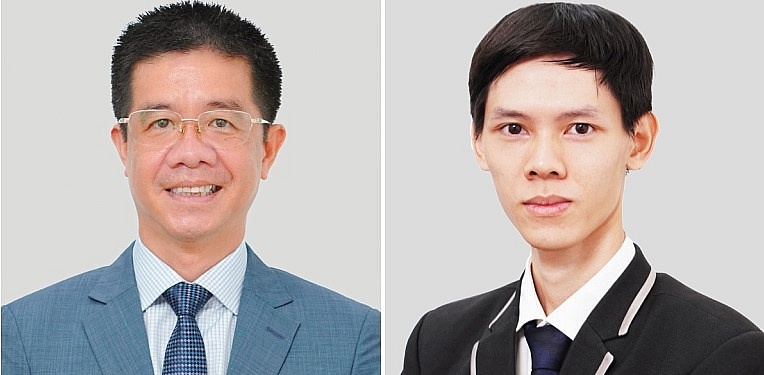Investors must be wary of the status of digital assets
According to one report, Vietnam’s cryptocurrency market ranked second among ASEAN countries with a total transaction value of over $100 billion for the period from July 2021 to June 2022 alone. Despite being a regional hotspot for digital currency transactions, Vietnam has not yet established a clear legal framework concerning digital assets, including cryptocurrencies and non-fungible tokens. As a result, digital assets transactions in Vietnam carry inherent risks for related parties.
 |
| Dr. Nguyen Quoc Vinh, Senior counsel, Indochine Counsel and Pham Viet Tuan, Associate, Indochine Counsel |
The 2015 Civil Code of Vietnam defines assets to include items, money, valuable papers, and property rights. Accordingly, digital assets do not well fit into any of these categories and are therefore not considered assets per se. Vietnamese authorities have different views on the legal status of digital assets within their regulatory domains.
For instance, the State Bank of Vietnam states that crypto currencies are not a lawful means of payment in Vietnam. All acts of issuance, supply and/or use of digital currencies as a form of payment are prohibited and subject to penalties. Meanwhile, the Ministry of Finance views cryptocurrencies as “property rights” under civil law and classify them as commodities, taxable under tax laws.
Against the foregoing background, court judgments should be a reliable source for law interpretation. Unfortunately, it does not meet such expectations. Two court cases in particular show the perplexed views of Vietnamese courts on the wobbly status of cryptocurrencies in Vietnam.
The first court judgment concerned a challenge against a tax collection decision. During 2008-2013, the plaintiff traded Bitcoin on exchanges. In 2015, the tax authority (the defendant) issued a tax collection decision to collect taxes from the plaintiff for his income of nearly $6 million from Bitcoin trading and the related VAT amount.
The plaintiff argued that Bitcoin is not considered as taxable goods or services under applicable laws. He submitted his case before Ben Tre People’s Court to seek the latter’s annulment of the tax collection decision.
In its judgment, the court reasoned that Bitcoin is neither a lawful means of payment in Vietnam nor recognised as goods or services by any legislation. Accordingly, the court annulled the tax collection decision. However, in the judgment, the court neither affirmed nor negated whether Bitcoin is a type of asset under Vietnamese laws.
Secondly, Ho Chi Minh City People’s Court recently held a first-instance trial of a so-called Bitcoin robbery case. In 2018, a group of individuals planned and staged an extortion scheme to obtain Bitcoin from a businessman who they claimed defrauded them to trade coins. The group successfully took away 168 Bitcoin and sold part of them for $800,000.
The victim reported to the police and the suspects were later criminally accused of the crime of “robbery of assets” under the 2015 Penal Code. In May this year, the court opened the hearing and sentenced the headman to life imprisonment while the accomplices received imprisonment sentences ranging 9-19 years. In addition, the defendants were ordered to pay the money gained from the sale of the Bitcoin to the owner.
In this case, the court reiterates that Vietnamese law does not acknowledge Bitcoin and other cryptocurrencies as lawful currencies or means of payment. Thus, there is no basis for a formal evaluation of the value of the taken Bitcoin as a Vietnamese court normally applies in determining the damage in a criminal case (for a corresponding penalty).
However, the court views that because part of the taken Bitcoin was converted/sold to a VND amount, such converted amount could be seen as the amount of damage to the Bitcoin owner. On this basis, the defendants were sentenced and ordered to compensate the Bitcoin owner.
In other jurisdictions, the above ruling may raise controversies because it appears to contradict with the ruling for the first Bitcoin case. Further, such a ruling may imply that Bitcoin and other cryptocurrencies can be considered lawful assets because the court applied the crime of “robbery of assets,” and the Bitcoin owner was paid the converted VND amount and other similar arguments.
Nevertheless, it seems far from clear that such an implication can be made from a practical point of view here. From one case to another, courts may express different views.
Vietnam does not have a clear-cut answer if crypto and other digital assets are considered lawful assets. Depending on a particular case, authorities may have different views on the same issue. Owners and investors should take extra care in transactions related to these assets.
 | SECUI cooperates with FPT IS to protect data and digital assets On July 19, FPT IS and SECUI jointly organised a seminar on protecting enterprises' data and digital assets in the age of digital transformation, aiming to assist organisations to tackle the issue of information security. |
 | A good time to explore digital assets With 10 years of experience in connecting IT and blockchain startups with investors worldwide, Hadi Malaeb, co-founder and CEO of Agora Group, shared with VIR’s Duc Hanh his thoughts on promoting blockchain startup and digital asset space. |
What the stars mean:
★ Poor ★ ★ Promising ★★★ Good ★★★★ Very good ★★★★★ Exceptional
Related Contents
Latest News
More News
- Legal protections for local companies (May 08, 2025 | 10:39)
- Drawing insights from data law draft (March 27, 2025 | 15:00)
- Sandbox for crypto assets in Vietnam: if not now, when? (March 11, 2025 | 11:34)
- Securities law reflects alignment efforts (February 25, 2025 | 10:42)
- New law marks shift for electricity market (February 12, 2025 | 14:30)
- Indochine Counsel launches new corporate identity (September 23, 2024 | 06:52)
- Key developments for ID's at credit institutions (April 24, 2024 | 16:30)
- Virtual assets in Vietnam: a regulatory outlook (January 04, 2024 | 17:11)
- Nuts and bolts of new personal data decree (May 09, 2023 | 15:00)
- Cybersecurity legislation’s upgrade (November 03, 2022 | 16:00)

 Tag:
Tag:





















 Mobile Version
Mobile Version